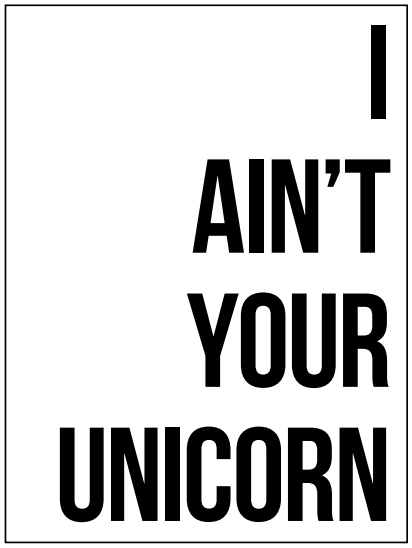“You know what we call you guys, right?”
I knew immediately that this was heading in a direction that I wanted no parts of. Before I could decide if I wanted to play dead in the backseat, he answered to amuse himself.
“Unicorns.”
I was in an uber. I had spent hours at my friend’s house in Lake View, a small community in San Francisco, where my parents grew up and where I was raised. I was taking an uber from her house to Balboa Bart station where I would take the last train home to Oakland.
My driver was from a place he had to mumble the name of. I had just told him that I was born in San Francisco. Before I could say my usual “and so were my parents and my parent’s parents,” he’d interrupted me to say the unicorn shit. I felt anger building in my chest when I realized that they call us unicorns because there are so few people who were born here, still here. Still being visible. So rarely seen that a sighting of us is considered mythical.
I could have kicked something if I weren’t being conscious of my budding non-violence practice (which is still deeply under construction, so please don’t test the infrastructure heavily, I am still a student of the “my Mama ain’t raise no punk” school).
Don’t get me wrong—I’m totally a unicorn. I’m quite queer. I’m Black, fiercely. I live a colorful life (not just as revenge). I enjoy frolicking and being magical as hell. And I give myself permission to marvel in the benefits of my work toward self-actualization. But I ain’t your unicorn.
And I damn sure ain’t going to be called no cute little name while my people are violently being disappeared from our homes. I won’t let the process of gentrification and police violence (that literally erases my community) be formed into a process of myth-making and laughed away.
Long before anyone in my family arrived here, this Ohlone land was called Yelamu. It would be invaded and colonized by the Spanish. It would go on to be called Yerba Buena. In 1847 it would be named San Francisco.
My grandmother grew up in San Francisco. In Hunter’s Point. She was 10 or 11 when she first saw a white person that wasn’t on television. It was the first time she had gone downtown in the City. She said it felt like she was in a dream. Her grandmother had come over from Port Arthur, Texas. She’d moved to San Francisco to join other family members working at the naval shipyard in Hunter’s Point. She migrated for a better life for her children. If you’d called any of them “unicorns” today, you might surely be backhanded.
When I was growing up in this place, the trains turned from orange to silver one day on my walk home from school. As I got older they only let us in five at a time at the 7-Eleven on Ocean St. When I was in high school I happened upon white neighborhoods that looked like houses made for dolls and couldn’t believe this was the same city I lived in. I experienced the losses of first Capone, then years later, Antwanisha and so many more becoming mourned younger and younger as I somehow managed to get older each year. When I was growing up in this place I danced in African print to gospel music for school assemblies and performed the Huki Lau in first grade. I went on a field trip to Alcatraz when my dad was fresh out of prison and my belly felt afraid the entire time I was there. I played a slave in a school play and didn’t know, until I was older and saw a picture of myself, that the repetitive motion I was taught to do simulated to the audience that I was picking cotton.
…………….
San Francisco has the highest displacement rate of Black families since post-Katrina New Orleans.
There’s an estimated 3-5.8% of us left in the City. This sometimes looks like tightly hugging people (whom I didn’t get along with in middle school) because I am glad to know that they are still alive. This looks like driving through my old neighborhood past certain houses and remembering that someone who used to live there had a mother who passed away some years ago. Then remembering, with greater devastation, that they themselves had been killed not long afterward. This looks like being the third generation to organize for a goddamn grocery store that sells affordable fruits and vegetables that aren’t rotten anywhere in District 10. ANYWHERE. This looks like a very sad dating pool, ‘cause I literally know everybody. And their mama. This means that when I remember my city–the place where I learned me before forgetting, I am remembering a place that no longer exists.
Sometimes, it’s like walking through a hologram.
We have history here. We are not unicorns. We are in danger. Erasure does not make us into myth.
* If you were born and raised in San Francisco and you find yourself to be in the back of an uber, approaching your destination and feel anger rising in your throat, remember this: 1) you ain’t nobody’s unicorn. 2) if you choose to be your own unicorn, then know this—unicorns are not easily defeated. They get to be beautiful and have a sword on their heads to protect their magic from anyone who dare come too close. ≠
This was originally published on January 14, 2017 at Tanea’s blog.


